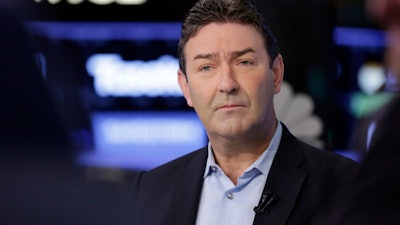
DOVER, Del. (AP) — A Delaware judge has dismissed claims against directors of McDonald's in a shareholder lawsuit challenging their handling of sexual harassment by former CEO Steve Easterbrook and the company's former top human resources executive.
The judge ruled Wednesday that the lawsuit does not support an inference that the board failed to respond to allegations involving Easterbrook and former Chief People Officer David Fairhurst, who were accused of promoting and participating in a "party atmosphere" at the company's Chicago headquarters.
The allegations date to 2018, when the board received reports that Fairhurst had pulled a female employee onto his lap at a company party. Easterbrook told a board committee that Fairhurst had been involved in a prior incident of sexual harassment in 2016 that had not been reported, and that he had been warned about excessive drinking at company events.
"When the head of the human resources function has repeatedly engaged in sexual harassment, that is the most vibrant of red flags regarding a potential problem with sexual harassment and misconduct," Vice Chancellor J. Travis Laster said.
Nevertheless, Easterbrook recommended a deviation from the company's no-tolerance policy and proposed that Fairhurst be punished by forfeiting half of his bonus payment for 2018 and signing a "last chance" letter. The board also undertook a broader effort to address sexual harassment and misconduct issues, which had led to protests by restaurant workers in cities around the country that drew scrutiny from several U.S. senators.
In October 2019, however, the board learned that Easterbrook was engaging in a prohibited relationship with a female subordinate that included sexually explicit private messages and video calls. Two weeks later, the board terminated Easterbrook "without cause," allowing him to retain tens of millions of dollars in stock-based benefits and other compensation, while firing Fairhurst "for cause."
"The confluence of events during 2018, including the revelations about the global chief people officer, led to action," Laster noted, saying it was not possible to infer that the defendants acted in bad faith or breached their duty of oversight.
The lawsuit also claimed that the directors breached their fiduciary duties by terminating Easterbrook without cause, arguing that they declined to fire him for cause because they feared "ugly litigation that would expose their own failures to address the company's problems with sexual harassment and misconduct."
Laster rejected that argument, noting that Delaware's "business judgment rule" protects decision-making by corporate directors absent a showing of bad faith.
"It is not reasonably conceivable that the director defendants sought to provide the CEO with a no-fault termination out of self-interest," Laster wrote. "It is also not reasonably conceivable that the director defendants breached their duty of care."
"Reasonable minds can disagree about whether the director defendants made the right decision by opting initially to terminate the CEO without cause," the judge added. "Even if the defendant directors made an objectively wrong decision, the business judgment rule protects them from liability for a good faith error."
Laster said the business judgment rule also shields the board's decision to hire Easterbrook and to give Fairhurst "one last chance."
At the time of his firing, Easterbrook told the company there were no other similar instances of misconduct. In July 2020, however, the company received an anonymous tip claiming that Easterbrook had engaged in a sexual relationship with another employee. An investigation revealed that, in addition to the relationship that prompted Easterbrook's termination, he had engaged in sexual relationships with at least three employees. He also used his company email account to transmit dozens of nude and sexually explicit photographs and videos, including photographs of the three employees.
The board sued Easterbrook, claiming it would not have terminated him without cause if it had known the extent of his misconduct. The company sought the return of equity awards he was granted in 2018 and 2019. In 2021, it announced that the lawsuit had been settled and that Easterbrook had returned equity awards and cash valued at more than $105 million.






















